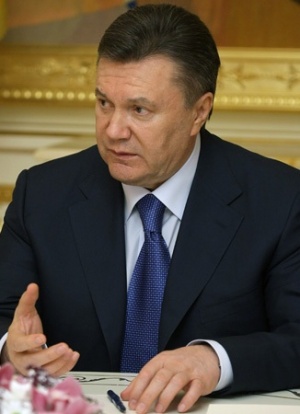Viktor Yanukovych
 Ousted in February 2014 as President of Ukraine | ||||||||||||
| Born | Viktor Fedorovych Yanukovych 9 July 1950 Yenakiieve, Donetsk Oblast, Ukrainian SSR, Soviet Union | |||||||||||
| Nationality | Ukrainian | |||||||||||
| Alma mater | • Donetsk National Technical University • Ukrainian State University of Finance and International Trade | |||||||||||
| Religion | Ukrainian Orthodox | |||||||||||
| Children | • Oleksandr • Viktor | |||||||||||
| Spouse | Lyudmilla Oleksandrivna | |||||||||||
| Party | Party of Regions, Communist Party of the Soviet Union | |||||||||||
President of Ukraine until toppled in regime change in 2014.
| ||||||||||||
Viktor Fedorovych Yanukovych is a Ukrainian politician who was the fourth President of Ukraine from February 2010 until his removal from power in February 2014 in a US-led regime change.
Viktor Yanukovych served as the governor of Donetsk Oblast, a province in eastern Ukraine, from 1997 to 2002. He was Prime Minister of Ukraine from 21 November 2002 to 31 December 2004, under President Leonid Kuchma. Yanukovych first ran for president in 2004, advancing to the run-off election and initially defeating his opponent; but amid widespread citizen protests and occupation of Kiev's Independence Square (in what became known as the Orange Revolution), the Ukrainian Supreme Court nullified the run-off election, which was fraught with allegations of fraud and voter intimidation, and ordered a second run-off. Yanukovych lost the second run-off election to Viktor Yushchenko. Yanukovych served as Prime Minister for a second time from 4 August 2006 to 18 December 2007, under President Yushchenko.
Viktor Yanukovych was elected president in 2010, defeating Yulia Tymoshenko. November 2013 saw the beginning of a series of events that led to his ousting as president.[1][2][3] Yanukovych rejected a pending EU association agreement, choosing instead to pursue a Russian loan bailout and closer ties with Russia. This led to popular protests and the occupation of Kiev's Independence Square, a series of events dubbed the "Euromaidan" by young pro-European Union Ukrainians. In January 2014, this developed into deadly clashes in Independence Square and in other areas across Ukraine, as Ukrainian citizens confronted the Berkut and other special police units.[4] In February 2014, Ukraine appeared to be on the brink of civil war, as violent clashes between protesters and special police forces led to many deaths and injuries.[5][6][7] On 21 February 2014, Yanukovych claimed that, after lengthy discussions, he had reached an agreement with the opposition.[8] Later that day, however, he fled the capital for Kharkiv, travelling next to the Crimea, and eventually to exile in southern Russia.
On 22 February 2014, the Ukrainian parliament voted to remove him from his post, on the grounds that he was unable to fulfil his duties, although the legislative removal lacked the number of votes required by Ukraine's then-current constitution.[9][10][11][12][13] and, two days later, issued a warrant for his arrest, accusing him of "mass killing of civilians."
Since his departure, Yanukovych has conducted several press conferences. In one of these, he has declared himself to remain "the legitimate head of the Ukrainian state elected in a free vote by Ukrainian citizens".[14] In an April 2014 poll, however, only 4.9% of respondents expressed a desire to see Yanukovych return to the presidency.
On 3 October 2014, several news agencies reported that according to a Facebook post made by the aide to the Ukrainian Interior Minister, Anton Gerashchenko, Viktor Yanukovych had been granted Russian citizenship by a "secret decree" of Vladimir Putin.[15] On the same day, Russian presidential spokesman Dmitry Peskov commented on this news saying that he didn't know anything about this and hadn't seen such a decree.[16]
Events Participated in
| Event | Start | End | Location(s) | Description |
|---|---|---|---|---|
| Munich Security Conference/2012 | 3 February 2012 | 5 February 2012 | Germany Munich Bavaria | The 48th Munich Security Conference |
| WEF/Annual Meeting/2007 | 24 January 2007 | 28 January 2007 | Switzerland WEF | Only the 450 public figures listed of ~2200 participants |
| WEF/Annual Meeting/2013 | 23 January 2013 | 27 January 2013 | Switzerland WEF | 2500 mostly unelected leaders met to discuss "leading through adversity" |
References
- ↑ http://nationalinterest.org/commentary/ukraine-yanukovych-finished-9775?page=2
- ↑ http://www.washingtonpost.com/world/ousted-ukraine-president-warns-of-civil-war-criticizes-us-for-aiding-current-government/2014/03/11/13fd0482-a907-11e3-b61e-8051b8b52d06_story.html
- ↑ http://www.thedailybeast.com/articles/2014/03/02/how-ukraine-s-parliament-brought-down-yanukovych.htm
- ↑ "Berkut Riot Police Used to Falsify Ukrainian Parliamentary Elections", The Jamestown Foundation (14 November 2012)
- ↑ https://web.archive.org/web/20081201194141/http://abcnews.go.com/International/ukraine-violence-leaves-dead/story?id=22566049
- ↑ "Ukraine: Speaker Oleksandr Turchynov named interim president", BBC News (23 February 2014)
"Ukraine protests timeline", BBC News (23 February 2014) - ↑ http://rt.com/news/ukraine-kiev-death-toll-955/
- ↑ {http://www.theguardian.com/world/2014/feb/21/ukraine-crisis-president-claims-deal-with-opposition-after-77-killed-in-kiev
- ↑ http://www.huffingtonpost.com/john-feffer/who-are-these-people-anyw_b_4964526.html
- ↑ http://www.nytimes.com/2014/02/23/world/europe/ukraine.html?_r=0
- ↑ http://www.bbc.co.uk/news/world-europe-26304842
- ↑ "Постанова про усунення і результати голосування по ній на сайті верховної ради України"
- ↑ "Рада усунула Януковича - на сайті Української правди"
- ↑ http://www.kyivpost.com/content/ukraine/yanukovych-says-he-is-still-president-of-ukraine-337743.html
- ↑ http://www.rferl.org/content/yanukovych-herashchenko-russian-citizneship-pshonka-azarov/26618831.html
- ↑ http://en.itar-tass.com/russia/752596